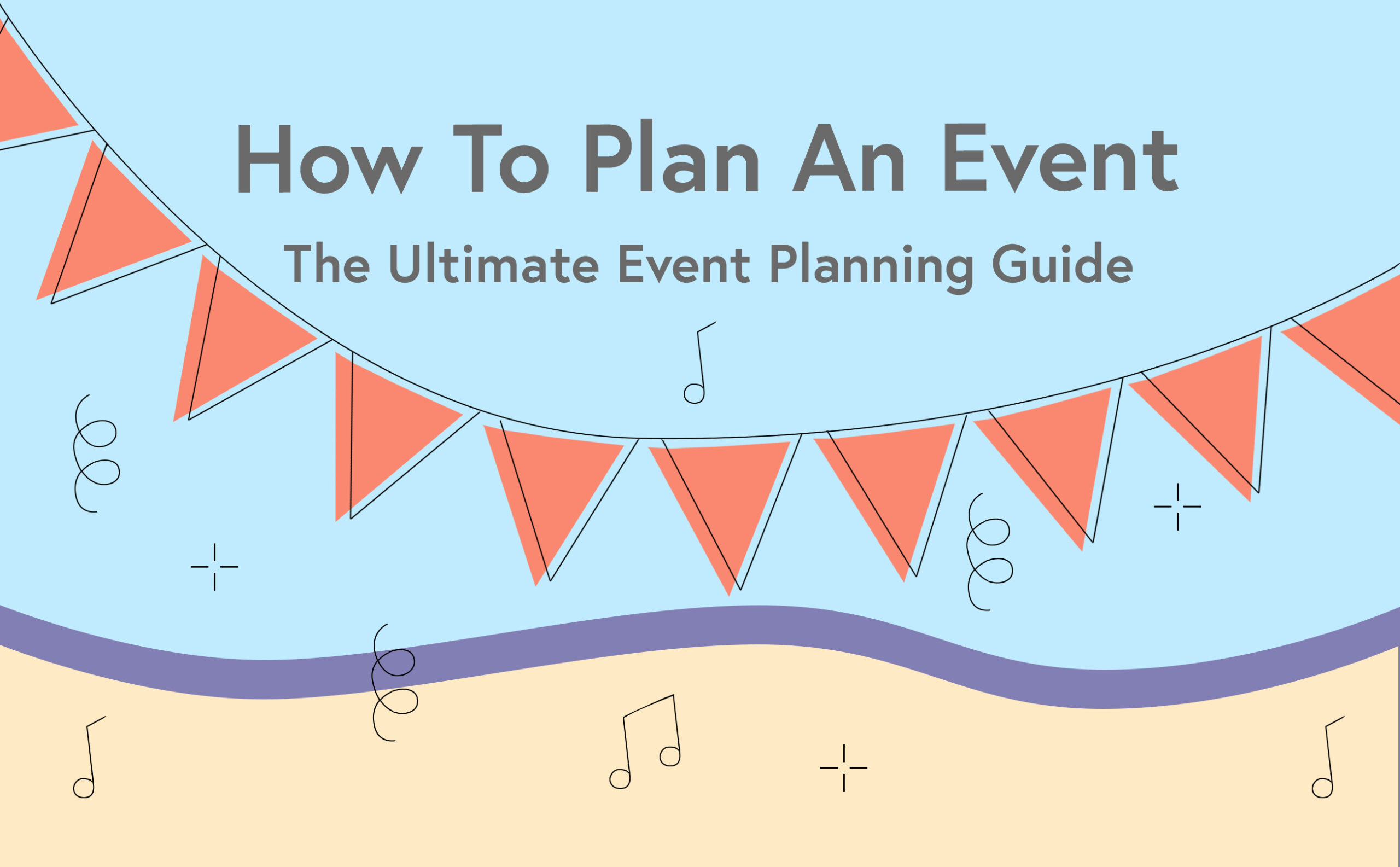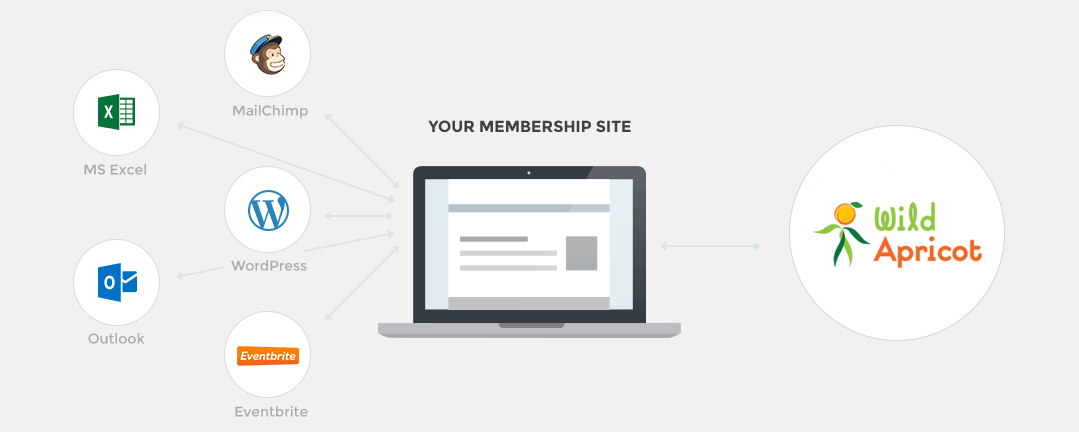

Without further ado, let’s dive into the ins and outs of planning an event!

An event plan is a guide for all the components of your event. Also called an event management plan, this tool organizes all of the steps and key information that go into running an event.
Whether you’re neck-deep in conference planning or setting up your first small park event, an event plan serves as your North Star as you prepare for the big day. Regardless of the size of your event, a good plan covers the same essential components (which we’ll cover in the next section!).
These components become an event management plan when they’re worked into SMART (Specific, Measurable, Achievable, Relevant, and Time-bound) goals and objectives, as well as a timeline. To identify your timeline, we recommend working backwards from your event date with a workback schedule.

A big part of knowing how to run an event successfully is keeping all of the components in one place—which is where an event plan comes in! With a clear event plan example, all you need to do is fill in the blanks.
Your event management plan should cover:
While this may feel like a daunting list, we’ve created a step-by-step breakdown of each element and everything you need to know to get started.
Looking for a bit more structure for planning an event? We’ve created a Free Event Planning Checklist you can simply download and modify to your organization’s needs.
If you want a few more event planning guidelines, we also have this guide to using your event planning checklist effectively! This guide includes details on timelines and best practices for event follow up.
Finally, we know that running an event looks different in the virtual sphere, so we’re also offering a Free Virtual Event Planning Checklist .
Planning a successful event comes down to following these 13 steps:
Ready for the complete breakdown on how to plan an event with these steps? Let’s dive in!
The very first step in planning a successful event is to establish tangible goals and objectives.
Ask yourself these questions:
If you know your organization’s key goals before planning, you can ensure that every part of your event is optimized for success.
Are you trying to raise awareness for a cause, or collect a predetermined amount of donations for your next project? Are you hoping to attract 50 guests or 500? Running an event will look a bit different depending on these answers.
Setting a goal with quantifiable metrics of success will make it easier for your team to ensure that you reach them.
Even better, figure out what happens if you meet, exceed, or miss your goal! At what point do you wrap up shop? At what point do you get to do something more exciting next time? Understanding where you’re going will only help you get there faster.

“Identifying a list of tangible and intangible goals for your event can give you a better sense of your event management needs. Your tangible goals may be to attract 500 attendees, sell 100 products at the event, or raise $1 million for charity. Your intangible goals will help drive these tangible goals and may include raising awareness about a product or cause, or recruiting volunteers.”
—Dr. Yuanyuan Zhou, Co-Founder of Whova
Any event takes a concerted team effort to handle all the details! A team of dedicated staff members can execute the task lists, and your board of directors can use their networks and knowledge to help with the big picture.
Some event planning roles to delegate include:
Assigning individual roles to team members creates a system of accountability and prevents tasks from falling to the wayside.
Plus, it’ll allow you to delegate—but don’t forget to account for committee meetings in your event plan timing!
“Delivering high-quality events requires buy-in at all levels of an organization. To create a truly unforgettable experience, you’ll need support from your executive team all the way to your on-site event staff.”
—Bill McGlade, CEM, President at EpiQ Creative Group
Rockstar volunteers are key to planning a successful event. But before you begin working with them, make sure you understand what their roles are and how you can begin recruiting them.
To make sure you have the volunteers you need, include volunteer recruitment early in your event management plan.
Establishing your event’s budget is one of the most important parts of planning an event.
Creating a solid budget enables you and your team to generate ideas within realistic parameters. This means that the parts of your event that you’re excited about stay top of mind, and are adjusted for what you can afford.
Some of the critical expenses you need to include in your budget for running an event are:
Even if some of these items aren’t fixed costs yet—for example, if you haven’t yet picked a venue—it’s important to keep the maximum that you can afford to spend in mind before making those decisions.
The date might already be pre-set for a recurring event, but if you’re planning an event that’s new, there are some things to keep in mind.
Be sure to consider the following before firming up your date:
Once you’ve set the date and have your budget outlined, you can start booking any external staff (such as caterers) you need right away.
Once you know all the costs and the timeline associated with your event, it’s time to start the real plan!
Creating an event master plan will allow you to ensure every aspect remains on track, as well as making it easier to coordinate with volunteers and event committee members.
Your event master plan should encompass all aspects of the event, including:
While planning an event, consider also creating a detailed timeline, so that everything moves smoothly. Include when any permits or insurance policies need to be submitted, when registration ends and a detailed timeline of the day-of.
Although it might be tempting to say, “It’s all in my head! I”ll be fine!” and not be concerned about writing it all down, beware: this kind of mentality will make it much more difficult for you to assign accountability! It’ll also make it more difficult to remember what you did for the next event—so do your future self a favor and keep everything written down.
Finally, if you or your organization has run previous events of a similar type, reviewing any documentation that exists at this stage can help you ensure you’re not missing anything.

“Ensure that all your activities and services are built for the size of your audience. In the past, we’ve run some open bars for our events and would have a single bartender make each individual’s drink from scratch. The line would get so long and our attendees would get frustrated. We knew we had to find a better solution but couldn’t afford to hire another bartender so we decided to make some large batched cocktails beforehand. This cut down the line tremendously and our attendees loved the drinks we made! When creating your master plan try to see if you can cut costs anywhere by DIY’ing. Also remember that with new apps like TaskRabbit and Craigslist you can often find a talented individual who could provide a service for a lot less, which will make your life a whole lot easier when planning and executing an event.”
Ciara Hautau, Senior Digital Marketer, Sparro
The right event software can make all the difference in streamlining the processes in your event master plan.
Types of event software that can be worthwhile having include:
If you run a membership organization and are sick of processing event registrations and payments by hand, membership management software could be an automation dream!
Did you know that WildApricot has been repeatedly voted the #1 Membership Management Software on the market?
It can help you:
Not only does membership management software take care of all event logistics, it also makes running membership organizations easier. You can automate away administrative tasks like managing your contacts, website, finances and email communication.
If you’d like to see if this kind of software is right for your organization, sign up for WildApricot’s 60-day free trial today!

As a small non-profit, this software has made organizing and communicating with our membership SO much easier. Membership is now automatic and registering for our events is easy for our guests and much less work for us.

—DeeDee LaBaron, Oregon Employment and Training Association
Once you have the date nailed down, it’s key to book your venue as soon as possible. Your event has to have a date and location nailed down before you can begin advertising, so this task is priority number one in your event master plan.
(Some flexibility around the date might also help you out at this stage and open up a wider variety of venues!)
When picking a venue, consider these event planning guidelines:

“Do not believe everything you see on Instagram or Pinterest. It’s a sad reality we face, but this industry is becoming more creative in terms of their marketing materials. They know the right photos to use, the right angles to photograph, the right photo edits to make venues look larger, cleaner, and nicer. So we advise going to see the venue in person, meeting your vendors in person, and taking the time to do your due diligence. And if you don’t have the time, hire the right professional who will work to ensure these components on your behalf.”
—Lauren Grech, CEO and Co-Founder of LLG Events
A timely and compelling theme can be just the thing that sets you apart from other events!
Choose a dynamic theme and apply it to all elements of your event, including its name. Highlight the elements that make it special, especially in online media, because this can be what attracts people to attend.
A few branding steps for event planning:
Once you have your name, tagline, and logo, use it in all your marketing collateral so that people who are unfamiliar with your organization will start recognizing your brand—and remember that the event is happening!

“In addition to creating an event name, tagline, and logo, create a hashtag for all your marketing materials and for attendees to use when talking about your event on social media. The shorter the better, but it should also be unique.
For instance, if your event is the National Conference for Dogs, you could create a hashtag such as #NCDwoof2019. It’s unique, memorable, and short.
During the event, designate someone to monitor live posts using the hashtag: “like” the Facebook posts, “retweet” the tweets, and so on, to amplify the buzz while the event is happening.
Following the event, you can search each individual social media platform for posts containing your hashtag for an excellent post-event report.”
—Nicole A. Meyerson, Founder, Project Parity
Want to know how to plan an event with awesome turnout? Book the best guests!
Industry leaders, subject matter experts or local influencers are all examples of great speakers or special guests to have at your event. The right speaker can make all the difference in increasing registrations!
Here are a few tips on how to a coordinate an event with notable speakers and special guests:
Partnerships and sponsors can help defray your costs and increase potential participation. When you involve other people or groups in your event, they have a stake in helping spread the word and making the event a success—the more the merrier, right?
When you set up an event with business collaborators, consider:
If you’re looking for businesses to sponsor your event, keep in mind that they’ll be more likely to do so if they can see the clear benefit to them.
If you’ve had sponsors in the past who are willing to speak up on your behalf, so much the better—but if not, be prepared to craft a compelling case in your sponsorship letter for support when you initially reach out.
Even with the most amazing speaker or entertainment line-up, you need a promotional plan to get people in the door.
Make sure you have the three major functions of event promotion covered in your event master plan:
This is the analytical side of your promotional plan, and should be driven by key objectives and KPIs to mark success! Anything within your marketing should be informed by the wants and needs of your attendees, plus the goal of your event. This can include a marketing landing page, social media campaigns or email drip campaigns.
Use information about your audience to figure out what channels to focus on to advertise your event, such as:
Once you’ve got your channels set, you can distribute and disseminate information to get people excited for and interested in attending the day-of!
News stations, radio and print media are all excellent ways to garner interest when you’re running an event. Reach out to media outlets and pitch an idea for a compelling story, such as a feature on a notable speaker or on your event’s cause.
Some components you might want to include in your promotional plan include:
Finally, no promotional plan is complete without the post-event thank-you’s, sponsor acknowledgements and articles about the event’s successful fundraising!

“Hire a professional photographer to attend the event and photograph, making it super easy to submit your event for publication. Plus, it’s a great thank-you gift to attendees!”
—Jen Naye Herrmann, Founder, Girl Meets Party
Okay—almost ready to go!
The last thing you need to put together is a full-day agenda for your event. This event or conference agenda should walk through the whole day from setup to cleanup. Include every detail, no matter how small, and you’ll have it all under control!
Here’s a quick example of what something like this might look like:
Identifying who needs to do what—and when—can also ensure that there’s clear accountability leading up to the event. Details are key when it comes to determining how to plan an event that rocks!
In the days leading up to a successful big day, you’ll need to check off some crucial last-minute items.
Here’s a list of what to prepare 48 hours in advance as you coordinate how to plan an event:
That last point is key. You’ve done all the hard work to create a robust event plan, so the last part is to rest and remember that you’re prepared for what comes next!
Running an event will come with stressors, but it should also be fun. Find time to relax and enjoy yourself when you can.
Congratulations: you survived planning and running an event!
But wait—it’s not quite over.
After collapsing on the sofa for a well-deserved nap, regroup to assess your event to see what went well, and what you can do better next time.
Check in with those success metrics and KPIs. Did you meet your goals? Surpass them? Find success in unexpected places?
Assess how your event was received by:
Once you’ve gotten back your attendee survey and talked to your staff, a few questions to ask yourself are:
Event and membership management software is incredibly helpful for streamlining how you gather and review this information. With WildApricot, you can reduce admin time with features like membership renewal, waitlists, discounts, early bird registration, email automation, QR codes and more.
Sign up for your 60-day free trial today to make event planning a breeze!